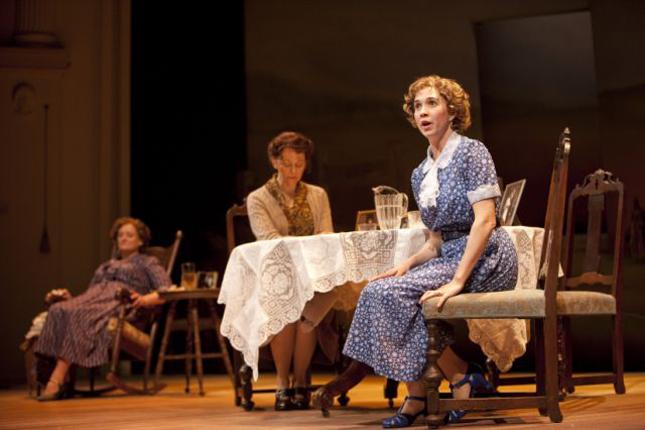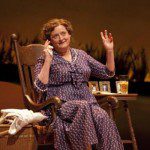The Women of Washington Theater
By • July 26, 2011 0 1596

We interviewed Holly Twyford, Nancy Robinette and Kimberly Schraf, the stars of Horton Foote’s “The Carpetbagger’s Daughters,” now completing its run at Ford’s Theater a few days before it opened.
The three women were going to go back to rehearsal again and they were a little frustrated.
“We are so eager for an audience,” Holly Twyford said, sitting with fellow actresses Nancy Robinette and Kimberly Schraf. “We don’t really know how we are doing in relation to an audience. There’s just us.”
“We invited some people to a dress rehearsal,” said Shraf, “just so we can get an idea.”
“In this play you can’t really work off of each other,” Robinette said. “The structure of the play, time is critical. It’s about what people remember and how those memories can be different.”
Sitting at a table at the Ford’s Theater with these three, you’re a little awe-struck. Together and apart, these three women are part of the life and lore of Washington’s theater history, key figures in the rise of theaters like the Studio Theater, the Shakespeare Company, Woolly Mammoth, Round House, Arena, and Signature. Name a theater, functioning or not, and chances are one of them at least has performed there.
When we talked to them, they were only a few days away from the opening of Horton Foote’s “The Carpetbaggers’ Children,” a three-character play in which they play sisters who remember their youth and their father, who had moved west to take over a plantation in Texas after the Civil War. That the characters are sisters talking about their father leaves dry-dust flavorings of “King Lear” and “The Three Sisters,” Texas style.
The three know each other very well and they know of each other. You can sense a tremendous respect and affection that they have for each other, something that seems to spring naturally out of the experience of preparing a play for which they are the key ingredients.
They’re a little shy about giving away what makes this play such a challenge and why a real audience is to be so desired. “It’s the memory thing,” Robinette said. “They don’t really talk to each other in the play. Rather, we all have longish monologues, talking about our father, about how he died, the funeral.”
“But Foote is such a wonderful writer, he had such a sense of place, those places in Texas that he wrote about all of his life,” Schraf said. “So the words are wonderful. They’re so evocative.”
“With Foote, and with the monologues, one of the most important things you can do, you HAVE to do, is listen,” Twyford said. “We barely interact. We listen to what the others say, and that’s a different kind of acting.”
When it comes to different kinds of acting, all three have had considerable experience. Among Washington theatergoers, Twyford and Robinette are vivid and fairly constant presences, working furiously from one play to the next. This is proof enough of the growing strength of Washington’s professional theater scene, in which a growing number of actors are booked a year, sometimes two years in advance.
Twyford and Robinette and Schraf are, regardless of whatever else they might have done, Washington theater people. Sitting across from Twyford and Robinette, I get an odd sense of familiarity, as if we’re long-time friends. If you write about the theater, of course, this is a natural feeling. With them, you feel as if you’ve spent a lot of time together.
Twyford’s voice and looks are distinctive. Her voice is a little raspy and husky, at turns funny, empathic and beguiling. Robinette emanates cautious warmth, but that impression may be because you tend to remember the characters she’s played—women who make an impression, who are like nobody else, especially when embodied by her.
Schraf is perhaps less familiar, but at Ford’s she has worked quite a bit, with major parts in “Member of the Wedding” and the recent, sharply successful “Sabrina Fair.” “Actually, when I was approached for this, I suggested them,” she said. “It’s just so great to work together.”
Surprisingly, what with all the history and exposure, Twyford and Robinette have never worked together before, and Twyford has never been seen on the Ford stage. Everybody, of course, goes to the Helen Hayes Awards, where Robinette and Twyford make frequent trips to the stage to receive acting awards on a regular basis. Schraf has had two recent nominations.
What they represent, though, is the cream of the crop among Washington actors, all very distinct and unique, but nonetheless, characterized by a strong pride in what they do and the community they work in. Schraf has the distinction of having worked in two productions of the play “The Women,” one at Arena and one at Studio. Twyford played Beatrice, Juliet and one of four Hamlets at the Folger…and yes, a tap-dancing pig at Adventure Theater. Robinette is known for eccentric, off-kilter women who leave a mark on the memory, particularly her performance as Florence Foster Jenkins, the society matron who wanted to sing in “Souvenirs”.
“You saw that?” she asked. “Well, you missed something. I fell off coming off the stage on one of my exits.” That would have been memorable, but her performance was more than sufficient to stay in my mind.
“I’m the baby,” Twyford says of her part in “The Carpetbaggers Children”
“That means she gets away with saying things,” Robinette says.
“Kimberly is the most empathic, the most articulate among us,” Twyford says. “She says things straight and on the mark.”
All of them, at one time or another, have done other things, tried out here and there, been in films or television or done audio book reading. Most folks in the Washington theater scene have. They are not movie stars, but they’re the stars of every play they’re in.
You think, remembering the play(s) you’ve seen them in, they can do pretty much anything. And that is probably true. They’re grounded now in family, in relationships, in parenthood.
On stage they can become Birdie of “The Little Foxes,” tough, strong women of “The Women,” Russian molls, femme fatales, dotty ladies or fierce mothers. Whatever they do, it will be in that singular manner that defines them and makes them memorable to us.
Robinette and Twyford will both move on after this to other plays, Twyford doing her first role at the Shakespeare Company. “Nothing so far,” says Schraf, shrugging. “I’m available, as they say.”
Not for long, I’m betting.
- Holly Twyford, Nancy Robinette and Kimberly Schraf




